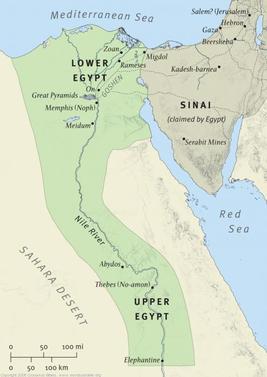The Field of Zoan (also known as Zoan or Tanis) was an important city in ancient Egypt, situated in the eastern Nile Delta. In biblical history, this location is especially significant because it was here that Moses performed many of God’s mighty miracles before Pharaoh. These miracles were part of God’s plan to deliver the Israelites from slavery, revealing His power and sovereignty not just to Egypt, but also to His own people.
Although the physical city of Zoan was known for its political importance, the Bible emphasizes it as a stage where God displayed His wonders, challenging the power of Egypt and its gods.
1. Zoan — A Stage for God’s Power (Psalm 78:11–13)
“They forgot what He had done— the wonders He had shown them. He did miracles for their ancestors in the land of Egypt, in the fields of Zoan. He divided the sea and led them through; He made the waters stand up like a wall.”
(Psalm 78:11–13, NIV)
In these verses, the Psalmist laments Israel’s forgetfulness. Despite witnessing God’s wonders—including the ten plagues and the parting of the Red Sea—they failed to remember His power. Zoan, mentioned by name, becomes a symbol of both God’s undeniable intervention in history and Israel’s spiritual blindness.
God doesn’t perform miracles just to impress; He does them to call people to faith and obedience. When we forget His works, like the Israelites did, we risk drifting into disobedience and doubt.
2. Zoan — A Site of Judgment and Redemption (Psalm 78:42–44)
“They did not remember His power—the day He redeemed them from the oppressor, when He displayed His signs in Egypt and His wonders in the field of Zoan. He turned their rivers into blood, and they could not drink from their streams.”
(Psalm 78:42–44, NIV)
Here, Zoan is associated with both judgment on Egypt and redemption for Israel. The plagues were not random; they were targeted acts of judgment against Egypt’s gods (see Exodus 12:12), showing that Yahweh alone is God.
Each plague dismantled Egypt’s false security—its gods, its economy, and its pride. Meanwhile, these acts served as signs of God’s commitment to redeem His covenant people, just as He had promised Abraham (Genesis 15:13–14).
3. Zoan’s Ancient Reputation (Numbers 13:22)
“They went up through the Negev and came to Hebron, where Ahiman, Sheshai and Talmai, the descendants of Anak, lived. (Hebron had been built seven years before Zoan in Egypt.)”
(Numbers 13:22, NIV)
This verse helps us understand Zoan’s historical prominence. Even before the conquest of Canaan, Zoan was already a well-established city in Egypt. Its age and influence reflect the might of the empire God overthrew on behalf of His people.
No matter how powerful or ancient a kingdom may seem, God is able to bring it low. The fall of mighty Egypt shows that human strength cannot stand against God’s purposes.
4. Prophetic References to Zoan (Isaiah 19:11, 13; Ezekiel 30:14)
These prophetic texts speak of Egypt’s downfall, often singling out Zoan as a place of failed wisdom and coming judgment:
Isaiah 19:11 — “
The officials of Zoan are nothing but fools…”
Isaiah 19:13 — “
The officials of Zoan have become fools; the leaders of Memphis are deceived…”
Ezekiel 30:14 — “
I will lay waste Pathros, set fire to Zoan…”
Even centers of political and intellectual power like Zoan are subject to God’s judgment. These verses show that nations who reject God’s truth will ultimately face His justice.
Conclusion: Why Zoan Matters
The Field of Zoan is more than just a location; it represents the moment when God demonstrated His unmatched power, judged His enemies, and redeemed His people. It reminds us that God is both powerful and faithful—He keeps His promises and defends those who trust in Him.
Just as God moved in Zoan to free His people, He has also moved through Christ to set us free from sin. Let us not forget His works, but remember them, trust Him, and share His story with others.
Want to keep learning?
Feel free to share this message with others. If you’d like to receive regular Bible teachings through email or WhatsApp, send a message to: +255 789001312









